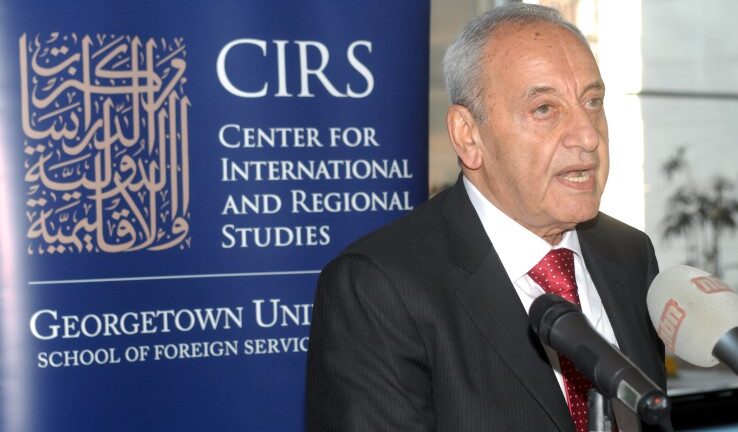Dialogue Series, Regional Studies
Compromising Democracy: The Lebanese Example

The Center for International and Regional Studies at the Georgetown University School of Foreign Service in Qatar hosted a luncheon talk for the visiting Speaker of the Lebanese Parliament, Nabih Berri, on November 19, 2008.
Berri has been the speaker of Lebanon’s parliament since 1992. He is effectively one of three heads of state with the prime minister and president. Berri, an advocate of the March 8 Alliance in Lebanon, is also the head of the Shi’a Muslim AMAL Movement.
Berri began by extending gratitude to H.H the Emir Hamad bin Khalifa Al Thani and H.E. the foreign and prime minister, Sheikh Hamad bin Jassim bin Jabor Al Thani, for Qatar’s key mediatory role between rival Lebanese political factions, which ultimately led to the resolution of Lebanon’s political deadlock earlier this year via the Doha Agreement 2008. Berri confirmed the successful implementation of the accord, pointing to the election of a president, the approval of the constitution by all parliamentary members and the formation of a national unity government.
He also extended gratitude to the State of Qatar for its help with the reconstruction of Lebanon following the 2006 Israel-Hezbollah war, in areas ranging from “healthcare to homes to houses of worship.” Berri also invited further assistance to clear the 2.4 million cluster bombs that remain scattered throughout Southern Lebanon.
Berri’s address provided a theoretical overview of the basis and key characteristics of a “congruent democracy” as distinct from other forms of democracy, as well as a practical account of its realisation in Lebanon.
Congruent democracy, he explained, emanates and develops in situations of weak national unification and a divided, heterogeneous population. In particular, he stated that the most important characteristic of a congruent democracy is the element of ruling through a large coalition such as a national unity government.
In talking about Lebanon’s experience, Berri confirmed the country’s early adoption of this system of governance since May 23, 1926, with the establishment of its first constitution. He highlighted the constitutional provisions which are central to the concept of congruent democracy, namely, ensuring that all sects are equally represented in the cabinet and among public services functions, and that freedom of religion is absolute (Articles 95 and 9 of the Lebanese Constitution respectively).
Citing its independence in 1943 and a host of domestic, regional and international influences that led to constitutional amendments of 1990, Berri reinforced the fact that Lebanon’s democracy are not static.
A number of key changes were highlighted under the rubric of Lebanon’s evolving congruent democracy. The Chamber of Deputies’ Muslim to Christian seat distribution ratio was changed from 5:6 to an equal 6:6, to accommodate for a growing Muslim majority. He also discussed Article 69 of the amended constitution which deems the government as resigned if more than 1/3 of the members withdraw. Other points discussed include the veto right extended to the Council of Ministers to create a system of unanimous decision-making and a revision in the balance of executive power extended to the prime minister and president.
On the question of whether or not congruent democracy proved to be a successful political system for Lebanon, Berri confirmed its positive outcome.
“Lebanon is unlike any other country in the world, in the light of its steadfast commitment and continuous recourse to dialogue meetings held both locally and internationally,” he said. He pointed to talks held in Lausanne, Saint-Cloud, Taif and Doha, as key examples of the operations of a congruent democracy.
Berri explained that the congruence culture, while evolving to better reflect the socio-political changes of its time, “has always been rooted in the minds of the Lebanese nationals.” As distinct from an inevitably unsuccessful export product, he stressed the importance of a “home-made and national democracy which must be consistent with the nature and hopes of its people.”
Berri concluded that his country’s culture of congruence, regardless of its results, constitutes the “security and safety valve of Lebanon’s political system.” As such, the lacking ingredient in Lebanon is not the recognition of congruent democracy per se, but the need to observe and respect the principle.
During the concluding Q&A session, Berri recalled the great show of national unity during the 2006 Israel-Hezbollah war, drawing upon examples of supported internal migration and united Lebanese resistance. Berri also highlighted nationalist ideologies, refusing the claim of a Lebanese “positive-neutral” political approach and endorsing Lebanon’s Arab identity and commitment to the Palestinian crisis. Finally, in countering the claim that the TAIF Agreement of 1989 runs parallel to a congruent democratic Lebanon, Berri ended by retracing Lebanon’s history from the days of Fakhreddine, who celebrated the unique demographics of the country where reconciliation and harmony should prevail.